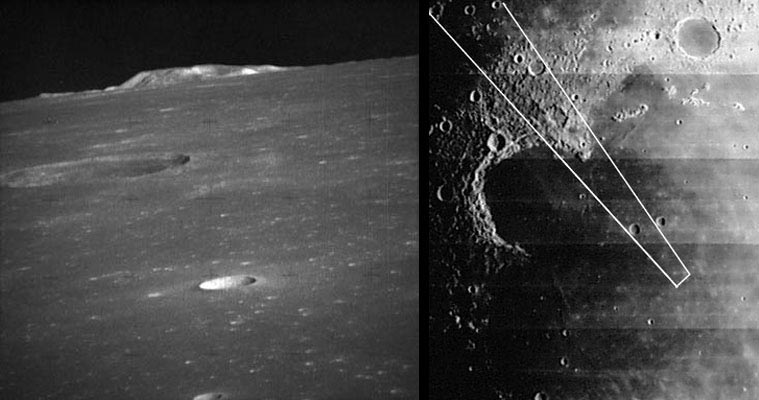June 2, 2008
An Oblique View of Prom. Laplace

image from Apollo 15 Lunar Flight Journal and AS15-81-10976 and LO IV-i34M
Sunday through Tuesday I will be at JPL reviewing the latest and last Cassini Radar image of Titan. It is the last for the nominal mission and now we start the funded two year extended mission. So here is a wonderful LPOD from nearly 4 years ago, Nov 11, 2004, and we will have more "best ofs" for the next two days.
We see the Moon from such a vast distance that our views mostly have overhead perspectives (except along the limb). Often I have wondered what a particular feature looks like on the ground. The Apollo images from the lunar surface provide that view for six spots, but some of the astronauts' low oblique images give a near ground perspective for more areas. And these images are often little known. This is the case for this low perspective looking across northern Mare Imbrium to the edge of the Sinus Iridum crater, which is called Promontory Laplace. This 2.6 km high headland is a fascinating lunar landform that I have observed many times, but until I stumbled across this image in the Apollo 15 Lunar Flight Journal had no idea what it looked like in profile. This view is essentially a cross-section through an impact crater rim. The right side slopes gently (about 8 degrees) down to the surrounding terrain, whereas the inner crater rim (left side) is much steeper - about 25 degrees. The outer rim slope is due to the feathering out of the rim uplift and ejecta, and the steep inner slope results from terrace-forming collapses. In the foreground of the image is the fresh simple crater Helicon B (5.6 km wide, 1.1 km deep) and beyond that is Helicon (25 km, 1.9 km).
Chuck Wood
Technical Details
I thank David Woods and Frank O'Brien for these images and the wonderful resource that their Apollo Journals are!
Related Links
Rükl plate 10
COMMENTS?
Register, Log in, and join in the comments.



